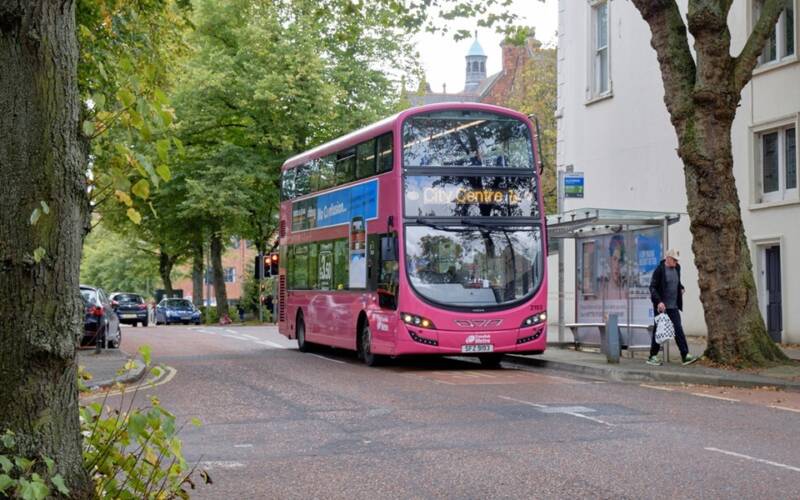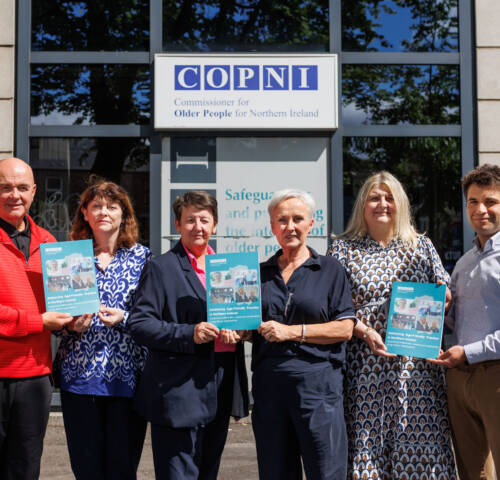We've compiled a Q&A for older people or for anyone who is worried about an older person. As the situation with coronavirus is changing regularly, we will aim to update this as often as required. However, please check in with the public health authorities such as NHS, the Public Health Agency for Northern Ireland, Department of Health and Ni Direct for live, up to date information.
We all need to do our bit to stop coronavirus from spreading:
- stay at home as much as possibles
- limit contact with other people
- keep your distance if you do go out (stay two metres apart)
- wash your hands well and often
- work from home if you can
Do not leave home if you or anyone in your household has symptoms. If you have symptoms you should book a free test.
What is coronavirus?
Coronavirus is a virus that affects your lungs and airways. Coronavirus symptoms in most people will be mild – a bit like cold or flu. They include:
- a new continuous cough
- a fever
- anosmia (a loss or a change in your normal sense of smell, which can also affect your sense of taste)
A few people will get worse symptoms and need medical attention. People aged over 65 and anyone living with an underlying long-term health condition is more likely to get worse symptoms.
Coronavirus (COVID-19): face coverings:
As of 10 August the use of face coverings in certain indoor settings, such as shops or shopping centres, will be mandatory. You must also wear a face covering on public transport.
The reason for using face coverings:
Coronavirus (COVID-19) usually spreads by droplets from coughs, sneezes and speaking. These droplets can also be picked up from surfaces, if you touch a surface and then your face without washing your hands first. This is why social distancing, regular hand hygiene, and covering coughs and sneezes is important in controlling the spread of the virus.
The best available scientific evidence is that, when used correctly, wearing a face covering may reduce the spread of coronavirus droplets in certain circumstances, helping to protect others.
Because face coverings are mainly intended to protect others, not the wearer, from coronavirus (COVID-19) they’re not a replacement for social distancing and regular hand washing.
Some circumstances make it difficult for some people to wear face coverings. In these circumstances people may have a 'reasonable excuse' not to wear a face covering in a shop or shopping centre.
These reasonable excuses include:
- If you need to seek medical assistance or to provide care to someone who needs assistance, such as a vulnerable person or in an emergency
- if you need to avoid injury, illness or escape from harm
- if you have a physical or mental illness or impairment, or a disability that means you cannot put on, wear or remove a face covering
- if putting on, wearing or removing a face covering would cause you severe distress
- if you are travelling with, or providing assistance to, someone who relies on lip reading to communicate
- if you need to remove it to avoid harm or injury or the risk of harm or injury to yourself or others
- if you need to eat, drink, or take medication
- if you are asked to remove your face covering by a police officer or other official.
There is no need to get a letter from a doctor or the government to show that you do not need to wear a face covering.
If you have a condition (for example, a disease such as asthma, chronic obstructive pulmonary disease (COPD), emphysema or bronchitis) which means you cannot wear a face covering you only need to say, if asked, that you cannot wear a face covering because you are exempt.
It is important that we all respect one another and remember that the reasons for not wearing a face covering may not always be visible.
If you do not wear a face covering and you are not under 13 or have a reasonable excuse for not wearing one, you are committing an offence and could be fined.
For more information on face coverings, including how to wear them correctly, please visit https://www.nidirect.gov.uk/articles/coronavirus-covid-19-face-coverings.
StopCOVID NI app
The new StopCOVID NI app will alert users if they have been in close contact with other users who have tested positive for Covid-19.
The app was designed using the Information Commissioners Office “Privacy by Design” principles and therefore uses only anonymised information in its operation.
https://www.nidirect.gov.uk/articles/coronavirus-covid-19-testing-and-contact-tracing
Guidance for 'Clinically Extremely Vulnerable' (CEV) and 'vulnerable' people
For the most up to date information and guidance for 'clinically extremely vulnerable' and 'vulnerable' people, please visit; Coronavirus (COVID-19): guidance for ‘clinically extremely vulnerable’ and ‘vulnerable’ people | nidirect
How can I reduce my risk of getting coronavirus?
One of the most important things you can do to reduce the risk of infection is to practice social distancing and wash your hands, frequently and thoroughly, with soap and hot water. You should wash your hands more often than you would normally.
You should wash your hands for at least 20 seconds or for two rounds of the song ‘Happy Birthday’, especially when you get home after going out, before eating or handling food, and after sneezing or blowing your nose.
You should also make sure you catch coughs or sneezes with a tissue or your sleeve – not your hands – and put used tissues in the bin. Then wash your hands.
Try to avoid touching your eyes, nose or mouth.
Coronavirus in the care home sector:
Further information surrounding coronavirus outbreaks in care homes can be found at:
http://www.hscboard.hscni.net/coronavirus/covid-19-care-home-outbreaks-faqs/
Older people receiving care:
Many older people may be receiving care through domiciliary care packages or in a residential setting. Guidance for these settings is available from the Public Health Agency website.
If you are worried about your health and social care during COVID-19 the Patient and Client Council offer a Freephone support service, supporting you with any questions, concerns or complaints you may have.
- Freephone telephone number: 0800 917 0222
- Email address: info.pcc@pcc-ni.net
'Check in and chat'
We're pleased to be working closely with Age NI to support their enhanced telephone service.
The 'Check in and chat' line is for the over 60s who want access to services or simply just want to talk about how their day went.
If you think this would benefit you or someone you know, get in touch on:
- Freephone: 0808 808 7575
- Email: info@ageni.org
COVID-19 Community Helpline
A freephone helpline to help those in vulnerable groups to access information, advice and support in relation to COVID-19 is open 9.00 am to 5.00pm, seven days a week.
The helpline is local to Northern Ireland, and is managed by Advice NI.
- Freephone number: 0808 802 0020
- Email: covid19@adviceni.net
- Text: ACTION to 81025
Covid-19 Vaccination Programme
We've put together a flyer in relation to frequently asked questions about the Covid-19 vaccine roll-out for older age groups. You can view this via the link below;
The COVID-19 vaccination programme is currently being delivered at Trust vaccination sites and GP practices. Some community pharmacies are also now offering COVID-19 vaccinations. For further information, please visit; COVID-19 vaccination programme in Northern Ireland | nidirect
Those aged 40 years or older
At present anyone who is aged 40 years and over (born on or before 31 March 1981) can book their COVID-19 vaccination appointments at one of Northern Ireland's regional vaccination centres (if they have not already been invited to receive the vaccine by their GP). You may also get vaccinated at a local pharmacy. For further information, please visit; COVID-19 vaccination programme in Northern Ireland | nidirect
Clinically Extremely Vulnerable aged over 16 at 31 March 2021
Anyone aged over 16 years of age at 31 March 2021 who has been classed as Clinical Extremely Vulnerable (CEV) can now also book online(external link opens in a new window / tab) (if they have not already been invited to receive the vaccine by their GP). For further information, please visit; COVID-19 vaccination programme in Northern Ireland | nidirect
Carers
If you are the main carer (aged 18 or over on the 31 March 2021) of an elderly or disabled person and have been unable to book an appointment through the online booking platform or call centre, you should contact your local Trust care co-ordinator. They will take your details and arrange to have a vaccination slot booked at the regional vaccination centre. For further information and contact details of your local Trust care co-ordinators, please visit; COVID-19 vaccination programme in Northern Ireland | nidirect
Where is the best place to stay up to date?
There is a lot of information and articles online, many of which give conflicting messages which can cause confusion and panic. The Public Health Agency (PHA) provide daily updates on the outbreak. Both the PHA and the Department of Health for Northern Ireland’s websites are updated regularly and are where you should go to for local updates. You can also visit the NHS website. The links of these websites are provided below.




